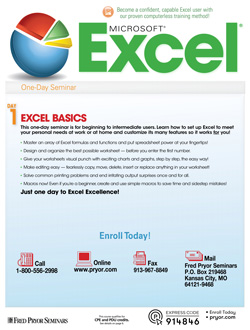Learn to take charge and get the job done ... and earn respect, loyalty and admiration along the way
Between the style extremes of passive and aggressive is an effective, winning management approach — the assertive style
Assertive doesn't mean overbearing, pushy or autocratic; it's a balanced approach that assures you'll handle people, get things done and communicate — all in the same level-headed, confident manner.
This exciting seminar will give you the skills that guarantee you'll leap the hurdles you face every day, earn more respect from co-workers and bosses, and feel better about your role as a manager and leader. You'll feel more prepared to "go to bat" for your employees, yourself, your managers, your organization … and project an assertive, straightforward style, consistently, every time!
After the seminar, you won't have to arm-wrestle your way around the office or feel meek and helpless when challenged. Enroll today and draw on some of the best ideas and methods available for more assertive, proactive management.
Gain the leadership skills you need today, tomorrow, and beyond! Learn how to ask for, and get, what you need from your team — when you need it, and with the quality you expect.
Get the best out of difficult people … instead of letting them get the better of you! Handle conflicts with employees, peers, and bosses the smooth, non-combative way!

Learn to take charge and get the job done ... and earn respect, loyalty and admiration along the way
Between the style extremes of passive and aggressive is an effective, winning management approach — the assertive style. "Assertive" doesn't mean overbearing, pushy, or autocratic; the assertive style is a valuable, balanced approach that ensures you'll work well with people, get things done, and communicate precisely — all in the same level-headed, confident manner.
Download BrochurePassive, Aggressive or Assertive? Understanding the winning management balance.
- The difference between passive, assertive, and aggressive management — and how to define a management style that avoids the extremes
- Nine common passive traits — and whether any of these traits interfere with your effectiveness
- The basic motivations of "bully" managers — and why an aggressive approach is disastrous
- 10 typical reasons why new managers fail — and tactics to avoid making the same mistakes
- 10 attitudes common to winning managers and assertive positives you can build on for future success
- Five simple questions that determine whether you have natural assertive tendencies
Your Attitude Inventory: Taking Stock of the Beliefs That Drive Your Behavior
- The four basic tenets of assertive behavior — and how they can guide you through every situation and challenge
- 10 down-to-earth ways to increase your self-respect and esteem
- Your 10 basic rights, and what you should — and shouldn't — expect from yourself and others
- How you can benefit from self-declaration — and get more control over your job, your career, and your life
- The five areas you must take responsibility for when developing a more assertive style
- 10 common irrational beliefs that lead to nonassertive behavior
Communication Essentials:Exchanging Information the Assertive Way
- The seven main components of effective, assertive communication, and ways to adapt them to your day-to-day activities
- How to express your opinions and thoughts in a direct way — without attacking or alienating others
- Sound steps to more productive two-way communication that allows you to compromise and achieve more win-win outcomes
- How to influence others through emotional appeals that are sincere and genuine, never "sappy" or weak
- Why "you's" must become "I's" when you confront someone
- It's not what you say, it's how you say it — how to avoid inadvertently sending the wrong message
- A clever approach that delivers a firm message by asking questions
The Assertive Supervisor: Dealing with Employees Firmly, Fairly and Confidently
- The secret to refusing a request without feeling guilty: four questions to ask yourself before turning someone down
- How to spell out and enforce limits for employees to solve common problems such as absenteeism, tardiness, and missed deadlines
- 10 solid principles for setting rules and policies that employees understand and respect
- How giving employees constructive feedback instead of constructive criticism prevents defensiveness and finds solutions to the problems at hand
- Nine surefire steps to help you discuss — and solve — recurring problems with employees
- Why assigning tasks to employees the right way ensures work gets done correctly and on time
- Five solid guidelines for giving recognition and praise so that you feel good, and your employees feel great!
The Total Communicator: Using an Innovative Range of Communication Tools
- Negative words that can put a bad spin on communication with coworkers
- Three ways to alter your voice to communicate more clearly, assertively, and meaningfully
- Unintentional messages you may be sending through body language and facial expressions
- Six specific ways to become a better listener and open new lines of communication
- How to hear and interpret the total message — not just words, but subtle changes in tone, inflection, and body language
- The critical mechanics of feedback: how to give and receive better follow-up communication
Day-to-Day Dilemmas: Handling and Solving Common Management Problems
- A simple three-part communication model that guarantees you'll stand up to pressure with cool-headed confidence
- Six ways to hold your ground in the face of hostility or aggression
- Eight specific guidelines for saying "no" effectively and handling even touchy situations without creating hard feelings or resentment
- How to tell whether you're being fairly or unfairly criticized
- A proven approach that helps you receive criticism in a positive way — without getting angry or feeling guilty
- Six no-nonsense actions you can take when someone finds fault with your performance
- A 12-part formula that helps you deal with everyday conflict
- How to manage disagreement and conflict with people in power — your bosses, customers, or top managers
- Tips for accepting compliments with grace and confidence, and receiving praise without seeming boastful or immodest


